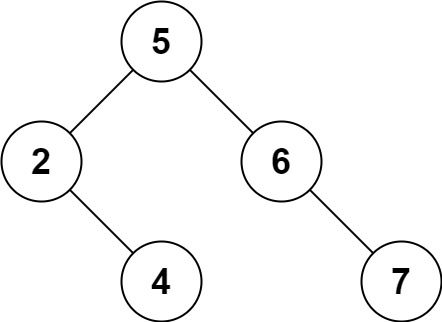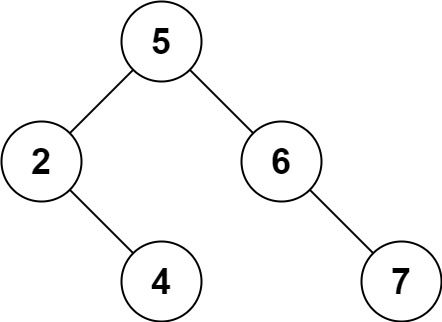给定一个二叉搜索树的根节点 root 和一个值 key,删除二叉搜索树中的 key 对应的节点,并保证二叉搜索树的性质不变。返回二叉搜索树(有可能被更新)的根节点的引用。
一般来说,删除节点可分为两个步骤:
- 首先找到需要删除的节点;
- 如果找到了,删除它。
示例 1:
输入:root = [5,3,6,2,4,null,7], key = 3 输出:[5,4,6,2,null,null,7] 解释:给定需要删除的节点值是 3,所以我们首先找到 3 这个节点,然后删除它。 一个正确的答案是 [5,4,6,2,null,null,7], 如下图所示。 另一个正确答案是 [5,2,6,null,4,null,7]。
示例 2:
输入: root = [5,3,6,2,4,null,7], key = 0 输出: [5,3,6,2,4,null,7] 解释: 二叉树不包含值为 0 的节点
示例 3:
输入: root = [], key = 0 输出: []
提示:
- 节点数的范围
[0, 104]. -105 <= Node.val <= 105- 节点值唯一
root是合法的二叉搜索树-105 <= key <= 105
进阶: 要求算法时间复杂度为 O(h),h 为树的高度。
二叉搜索树有以下性质:
- 若任意节点的左子树不空,则左子树上所有节点的值均小于它的根节点的值;
- 若任意节点的右子树不空,则右子树上所有节点的值均大于它的根节点的值;
- 任意节点的左、右子树也分别为二叉搜索树。
我们可以递归判断当前节点
- 若
$root.val>key$ ,则递归左子树; - 若
$root.val<key$ ,则递归右子树; - 若
$root.val=key$ ,则进一步判断:- 若
$root$ 没有左子树,则$root.right$ 顶替$root$ 的位置; - 若
$root$ 没有右子树,则$root.left$ 顶替$root$ 的位置; - 若
$root$ 同时存在左右子树,则将左子树转移至右子树的最左节点的左子树上,然后$root.right$ 顶替$root$ 的位置。
- 若
时间复杂度
# Definition for a binary tree node.
# class TreeNode:
# def __init__(self, val=0, left=None, right=None):
# self.val = val
# self.left = left
# self.right = right
class Solution:
def deleteNode(self, root: Optional[TreeNode], key: int) -> Optional[TreeNode]:
if root is None:
return None
if root.val > key:
root.left = self.deleteNode(root.left, key)
return root
if root.val < key:
root.right = self.deleteNode(root.right, key)
return root
if root.left is None:
return root.right
if root.right is None:
return root.left
node = root.right
while node.left:
node = node.left
node.left = root.left
root = root.right
return root/**
* Definition for a binary tree node.
* public class TreeNode {
* int val;
* TreeNode left;
* TreeNode right;
* TreeNode() {}
* TreeNode(int val) { this.val = val; }
* TreeNode(int val, TreeNode left, TreeNode right) {
* this.val = val;
* this.left = left;
* this.right = right;
* }
* }
*/
class Solution {
public TreeNode deleteNode(TreeNode root, int key) {
if (root == null) {
return null;
}
if (root.val > key) {
root.left = deleteNode(root.left, key);
return root;
}
if (root.val < key) {
root.right = deleteNode(root.right, key);
return root;
}
if (root.left == null) {
return root.right;
}
if (root.right == null) {
return root.left;
}
TreeNode node = root.right;
while (node.left != null) {
node = node.left;
}
node.left = root.left;
root = root.right;
return root;
}
}/**
* Definition for a binary tree node.
* struct TreeNode {
* int val;
* TreeNode *left;
* TreeNode *right;
* TreeNode() : val(0), left(nullptr), right(nullptr) {}
* TreeNode(int x) : val(x), left(nullptr), right(nullptr) {}
* TreeNode(int x, TreeNode *left, TreeNode *right) : val(x), left(left), right(right) {}
* };
*/
class Solution {
public:
TreeNode* deleteNode(TreeNode* root, int key) {
if (!root) return root;
if (root->val > key) {
root->left = deleteNode(root->left, key);
return root;
}
if (root->val < key) {
root->right = deleteNode(root->right, key);
return root;
}
if (!root->left) return root->right;
if (!root->right) return root->left;
TreeNode* node = root->right;
while (node->left) node = node->left;
node->left = root->left;
root = root->right;
return root;
}
};/**
* Definition for a binary tree node.
* type TreeNode struct {
* Val int
* Left *TreeNode
* Right *TreeNode
* }
*/
func deleteNode(root *TreeNode, key int) *TreeNode {
if root == nil {
return nil
}
if root.Val > key {
root.Left = deleteNode(root.Left, key)
return root
}
if root.Val < key {
root.Right = deleteNode(root.Right, key)
return root
}
if root.Left == nil {
return root.Right
}
if root.Right == nil {
return root.Left
}
node := root.Right
for node.Left != nil {
node = node.Left
}
node.Left = root.Left
root = root.Right
return root
}/**
* Definition for a binary tree node.
* class TreeNode {
* val: number
* left: TreeNode | null
* right: TreeNode | null
* constructor(val?: number, left?: TreeNode | null, right?: TreeNode | null) {
* this.val = (val===undefined ? 0 : val)
* this.left = (left===undefined ? null : left)
* this.right = (right===undefined ? null : right)
* }
* }
*/
function deleteNode(root: TreeNode | null, key: number): TreeNode | null {
if (root == null) {
return root;
}
const { val, left, right } = root;
if (val > key) {
root.left = deleteNode(left, key);
} else if (val < key) {
root.right = deleteNode(right, key);
} else {
if (left == null && right == null) {
root = null;
} else if (left == null || right == null) {
root = left || right;
} else {
if (right.left == null) {
right.left = left;
root = right;
} else {
let minPreNode = right;
while (minPreNode.left.left != null) {
minPreNode = minPreNode.left;
}
const minVal = minPreNode.left.val;
root.val = minVal;
minPreNode.left = deleteNode(minPreNode.left, minVal);
}
}
}
return root;
}// Definition for a binary tree node.
// #[derive(Debug, PartialEq, Eq)]
// pub struct TreeNode {
// pub val: i32,
// pub left: Option<Rc<RefCell<TreeNode>>>,
// pub right: Option<Rc<RefCell<TreeNode>>>,
// }
//
// impl TreeNode {
// #[inline]
// pub fn new(val: i32) -> Self {
// TreeNode {
// val,
// left: None,
// right: None
// }
// }
// }
use std::rc::Rc;
use std::cell::RefCell;
impl Solution {
fn dfs(root: &Option<Rc<RefCell<TreeNode>>>) -> i32 {
let node = root.as_ref().unwrap().borrow();
if node.left.is_none() {
return node.val;
}
Self::dfs(&node.left)
}
pub fn delete_node(
mut root: Option<Rc<RefCell<TreeNode>>>,
key: i32
) -> Option<Rc<RefCell<TreeNode>>> {
if root.is_some() {
let mut node = root.as_mut().unwrap().borrow_mut();
match node.val.cmp(&key) {
std::cmp::Ordering::Less => {
node.right = Self::delete_node(node.right.take(), key);
}
std::cmp::Ordering::Greater => {
node.left = Self::delete_node(node.left.take(), key);
}
std::cmp::Ordering::Equal => {
match (node.left.is_some(), node.right.is_some()) {
(false, false) => {
return None;
}
(true, false) => {
return node.left.take();
}
(false, true) => {
return node.right.take();
}
(true, true) => {
if node.right.as_ref().unwrap().borrow().left.is_none() {
let mut r = node.right.take();
r.as_mut().unwrap().borrow_mut().left = node.left.take();
return r;
} else {
let val = Self::dfs(&node.right);
node.val = val;
node.right = Self::delete_node(node.right.take(), val);
}
}
};
}
}
}
root
}
}
